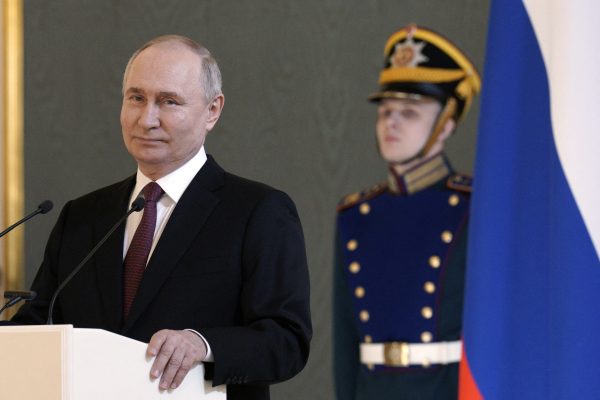On 6 October, Latvia’s parliamentary election day, popular social network Draugiem.lv was hacked, apparently by pro-Kremlin online forces.
Although the site’s front page had pro-Russia messages on it for two hours, no user data was compromised and the hacking did not affect the process of voting or its outcome, according to Latvian officials. The incident, however, showed Moscow’s continued interest in undermining Latvia’s democratic processes and the need for greater resilience. The balloting chose a new parliament for Latvia that will form the new cabinet and rule the country for the next four years.
The front page of Draugiem.lv, the eighth most popular website in Latvia, was replaced by a Russian flag and a message saying: “Latvians, it affects you. Russia’s border never ends! The Russian world can and should unite all those who treasure the Russian name and culture wherever they live – in Russia or beyond its borders. More often, you use the string of words – ‘The Russian world!’” The website’s login page also played the Russian national anthem and displayed photos of soldiers and Russia’s president Vladimir Putin, according to Latvian national media LSM.
An hour after the attack, the spokesperson for Draugiem.lv, Janis Palkavnieks, confirmed the hack and said that it had been reported to the Latvian Security Police and CERT.LV, a cyber-defense institution. For a few hours, the Draugiem.lv team took the site offline. At the time of the incident, Latvian Foreign Minister Edgars Rinkēvičs tweeted that, despite the attack, “we are quite well prepared to tackle any possible interference in our elections.”
However, the “fact that the first page of the portal was changed is a significant event,” tech security expert and lead researcher Kirils Solovjovs from Possible Security told leading Latvian online news media Delfi. Solovjovs stated, “This shows that electronic voting in the current geopolitical environment is not the type of voting that should be implemented in the coming years. This is something we should actually avoid.” Whether the hack was perpetrated by real Russian nationalists or others wishing to give that impression remains uncertain. Though he did not speculate about the source of the attack, Solovjovs said he did not think that it came from Russia, since, in his opinion, “such a message on the election day could only achieve that people would not want to vote for parties that may be linked to the Kremlin.” Whatever the attack’s origins, the Kremlin has been trying to interfere in Latvian domestic politics for years. Since Latvia has a large population of ethnic Russians, Latvian Security Police predicted cyber attacks during the election campaign. Although it is still unknown who hacked Draugiem.lv, the Kremlin’s hand seems behind the incident, given the pro-Moscow material used in the attack.
Regardless of whether the hack changed the minds of any voters, the election results doubtless brought some cheer to Moscow. According to the Central Election Commission of Latvia, the Harmony Party, the main political force of Latvian Russian speakers, received the highest vote total (19.8 percent). In the past, Harmony received financial support from the United Russia Party, though it cut those ties last October. The party, according to Re:Baltica, is widely seen as “pro-Russian” because of its appeal to Russian-speaking voters and “pro-Kremlin” due to its support for Russia’s annexation of Crimea. The Harmony party was followed by KPV LV (14.3 percent) which is known for its populist rhetoric and attacks on the media, and the previously unrepresented New Conservative Party (13.6 percent), which campaigned against corruption and strongly supports transatlantic relations. Trailing parties included For Development/For! (12 percent), a new group that backs liberal, pro-Western values, and the National Alliance (11 percent), a nationalistic force which has been in power for many years, but lost seats in this year’s voting. Other less successful parties included a party that has strong links to the mayor of Ventspils, Aivars Lembergs; the Greens and Farmers Union (9.9 percent); and the liberal, pro-Western New Unity (6.7 percent).
Despite alarms raised by the Western press, including the BBC and the New York Times, Harmony’s electoral success is likely to be limited. The party actually lost an absolute number of seats, while the new, pro-Western parties gained seats. Harmony will still have the largest contingent in the legislature, but is likely to remain in opposition in the upcoming coalition talks. Other Latvian parties are unlikely to be willing to form a coalition with Harmony due to its past financial ties to Moscow’s United Russia ruling party and the popular perception that it does not hold “Latvian” values.
Though Latvian officials claim no voting data was affected by the hack and no election results were influenced, such attacks continue to occur despite efforts to increase societal resilience. As previous annual reports of the Latvian Security Police have shown, Russia has long targeted Latvia’s information space by spreading disinformation, using Internet trolls, and conducting cyber attacks. Although a recent report by the group Kremlin Watch lists Latvia as one of the most successful countries at tackling such threats, the election day incident shows that more needs to be done.
Another indicator from the election day – less directly tied to Moscow, but still worrisome – shows the need to strengthen Latvia’s democracy. Participation was low, with only 54.59 percent of the population voting. “It’s a slap in the face for the previous coalition,” said political scientist Ilga Kreituse on Latvian National Television. “It is also a warning to the newly elected because it means that people do not believe they can change the situation by voting.
CEPA StratCom is an online journal covering crucial topics in strategic communications in the transatlantic community. All opinions are those of the author and do not necessarily represent the position or views of the institutions they represent or the Center for European Policy Analysis.
Europe’s Edge is CEPA’s online journal covering critical topics on the foreign policy docket across Europe and North America. All opinions are those of the author and do not necessarily represent the position or views of the institutions they represent or the Center for European Policy Analysis.





